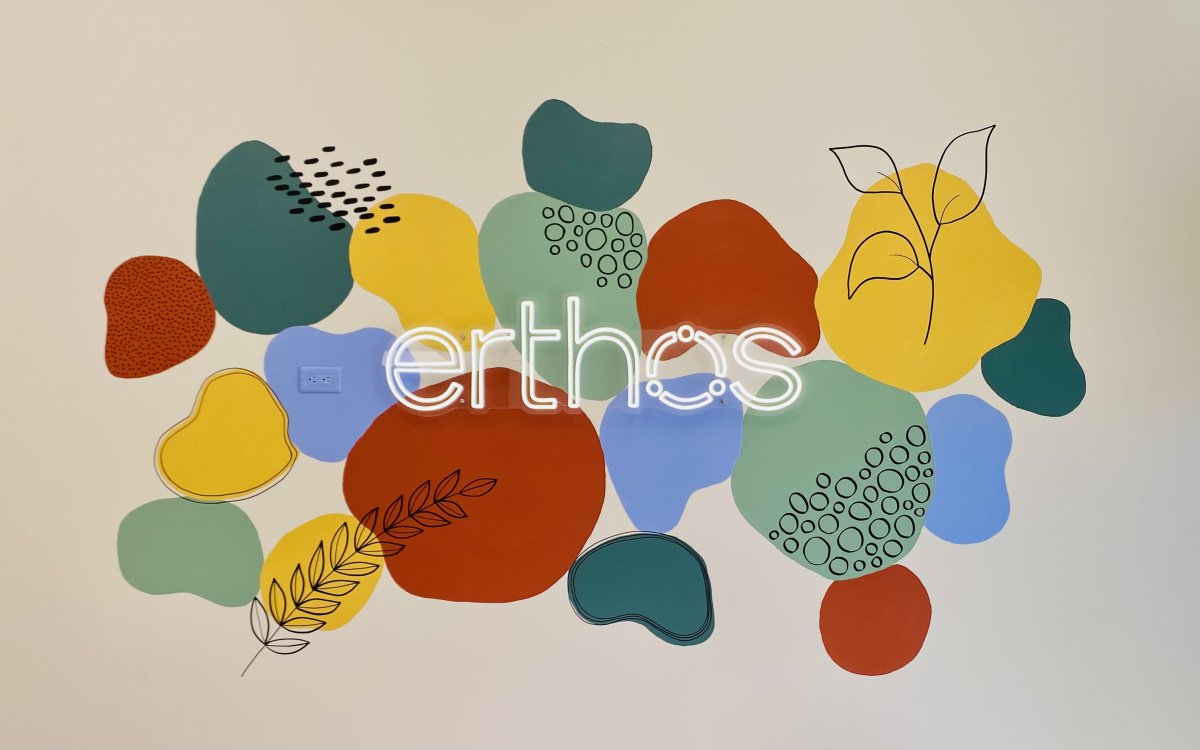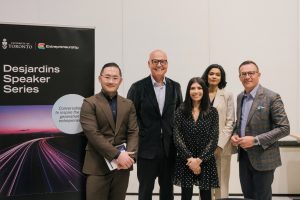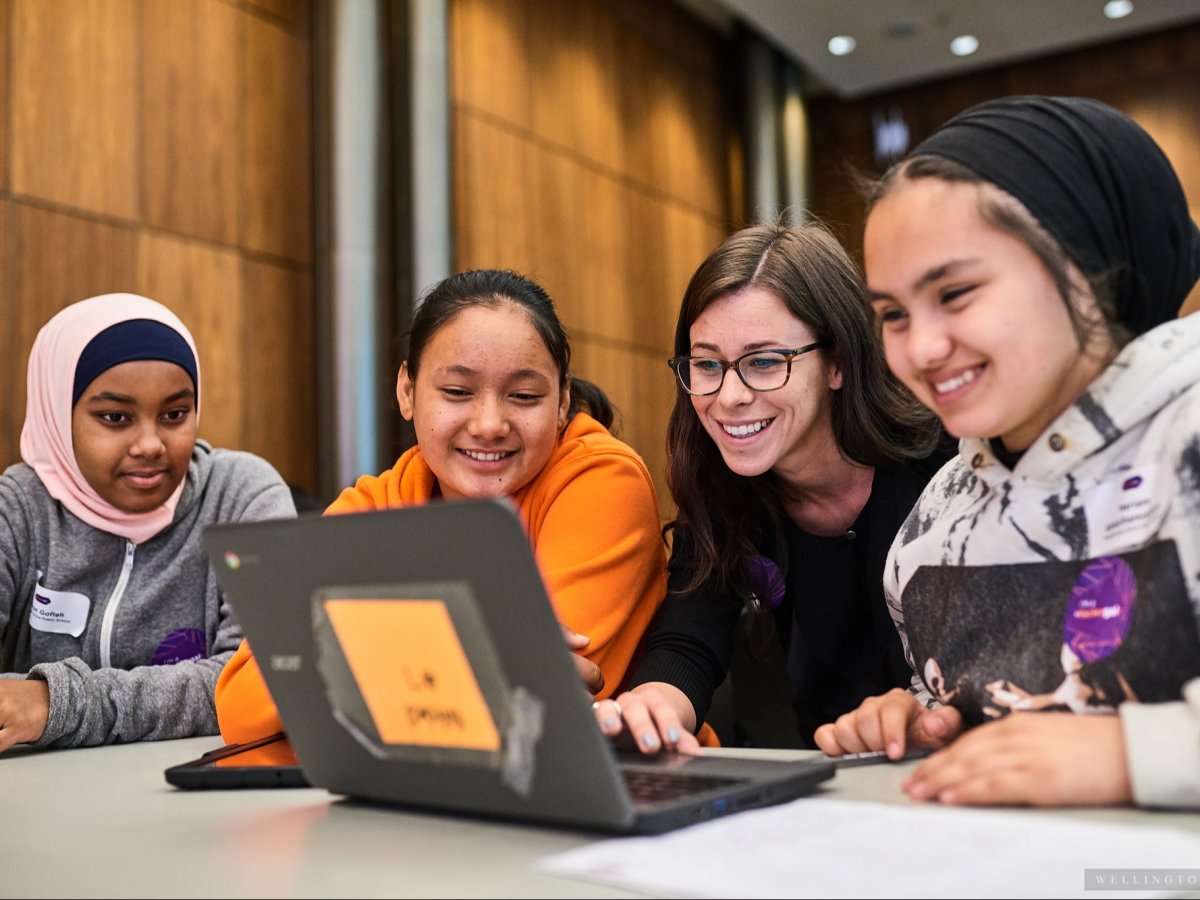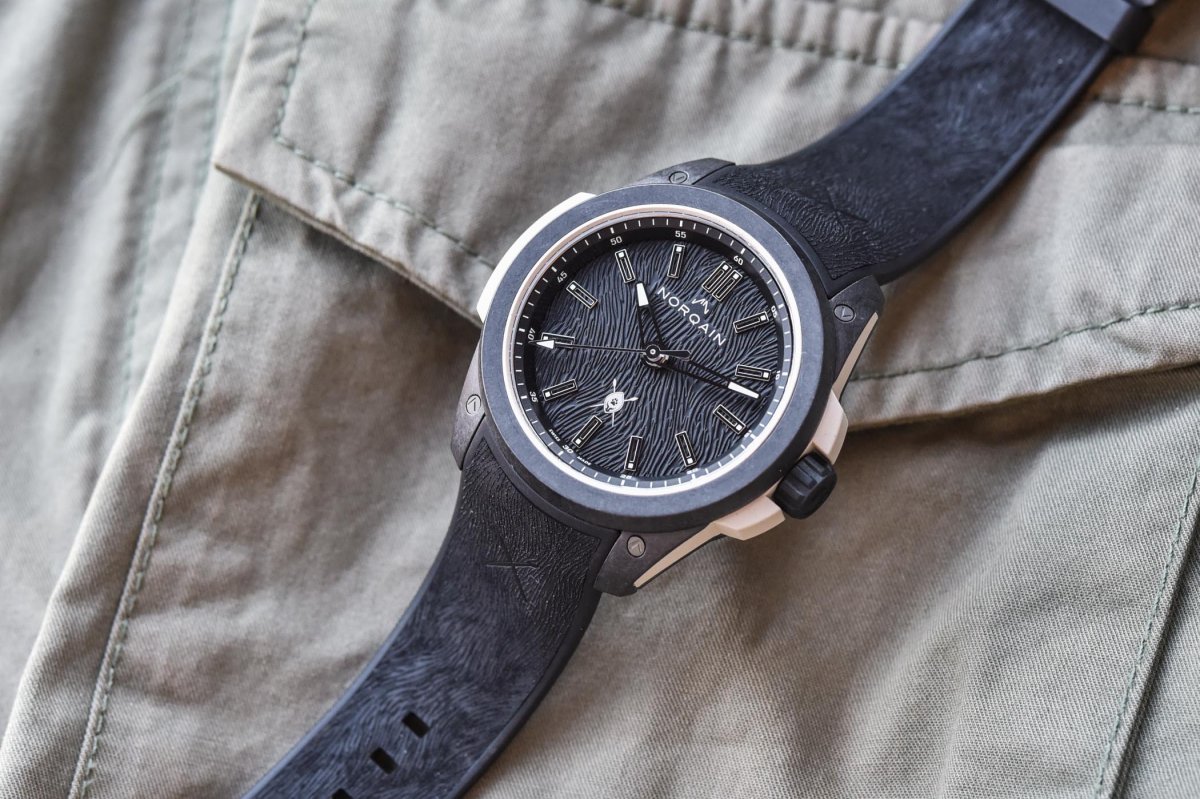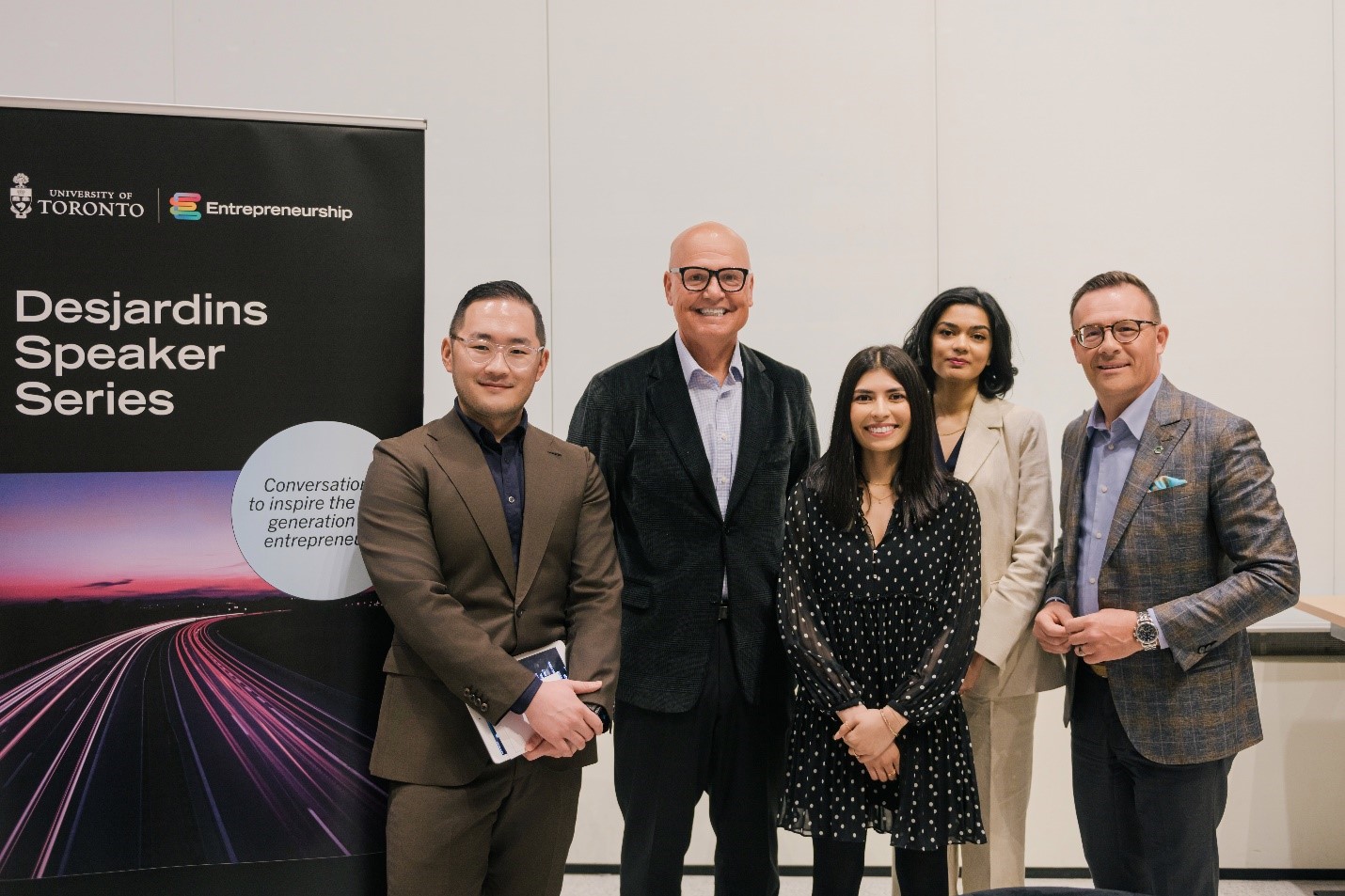[vc_row][vc_column][vc_column_text]Single-use plastic is an issue that spans the globe. Straws, bags, packaging, utensils—where do they all go? Landfills and sometimes recycling. What if they could be fully biodegradable?
Co-founded by former University of Toronto students, Nuha Siddiqui, Kritika Tyagi, and Chang Dong, erthos, a biodegradable plant-based plastic company, is creating products that do just that.
Originally branded as EcoPackers, in 2016, the trio set out to create a packaging solution that was completely compostable and compatible with the current infrastructure in the industry. Now, the company has rebranded as erthos to better reflect its overall goal of helping the planet through all forms of single-use plastic, not just packaging.
“We focus on solutions that are for single-use plastics, and we create 100 percent compostable and compatible alternatives,” said Siddiqui. “We work directly with manufacturers and brands to ensure plant-powered materials become the new normal for our planet.”
After years of research and development, along with their new rebranding, the company is excited to take its product to market and change the way plastic is used and thought of in society.


Its new icon is a play on the classic recycling symbol, combing a three-pillar approach that represents Earth, Innovation, and Community with a circle that represents planet earth. All future products that are created with erthos solutions will be erthos-certified and bear the symbol, so consumers will know that their single-use plastic is better for the environment.
For this week’s Startup Spotlight, Bay Street Bull spoke with Nuha Siddiqui, CEO and Co-Founder of erthos, about creating a solution to a worldwide problem, being a woman in STEM, and the future of single-use plastics.[/vc_column_text][vc_text_separator title=”Q&A” color=”custom” border_width=”3″ accent_color=”#6aa37f”][vc_column_text]Take me back to the beginning, when EcoPackers (now erthos) was created. How was that formed?
EcoPackers was actually a research project that I started back in 2016. I was a student at the University of Toronto, studying environmental economics and business. When I probably should have been doing my classwork, I was actually working on exposing myself to this idea of purpose-driven ventures and social enterprises. I was learning a lot about the future of our environment and how industrialization and business were really making an impact on that. We saw so much innovation and progress happening in the world, but we still heard about reports and studies coming out where plastics were pretty much going to take over our entire environment—it really didn’t make sense to me.
So, I started EcoPackers, honestly, because I was curious and I wanted to learn more about the industry and I wanted to see if there was any way that we could create even the smallest solution to something like packaging.
It was really just a passion project. I didn’t really think it would turn into something that I would do full time as a CEO, but along the way, I was able to meet some of my incredible co-founders, Kritika Tyagi and Chang Dong, a plant biologist, and a chemical engineer. As we were approaching graduation, we said we would give ourselves one year after we graduated to try to find a way to validate what we were building, get some traction and really turn our project into something real. A year after graduation, we incorporated the company officially, and fast-forward to today, we’re now a team of 20, we’ve raised about $7.3 million, and we have operations in both Canada and China solving this massive problem.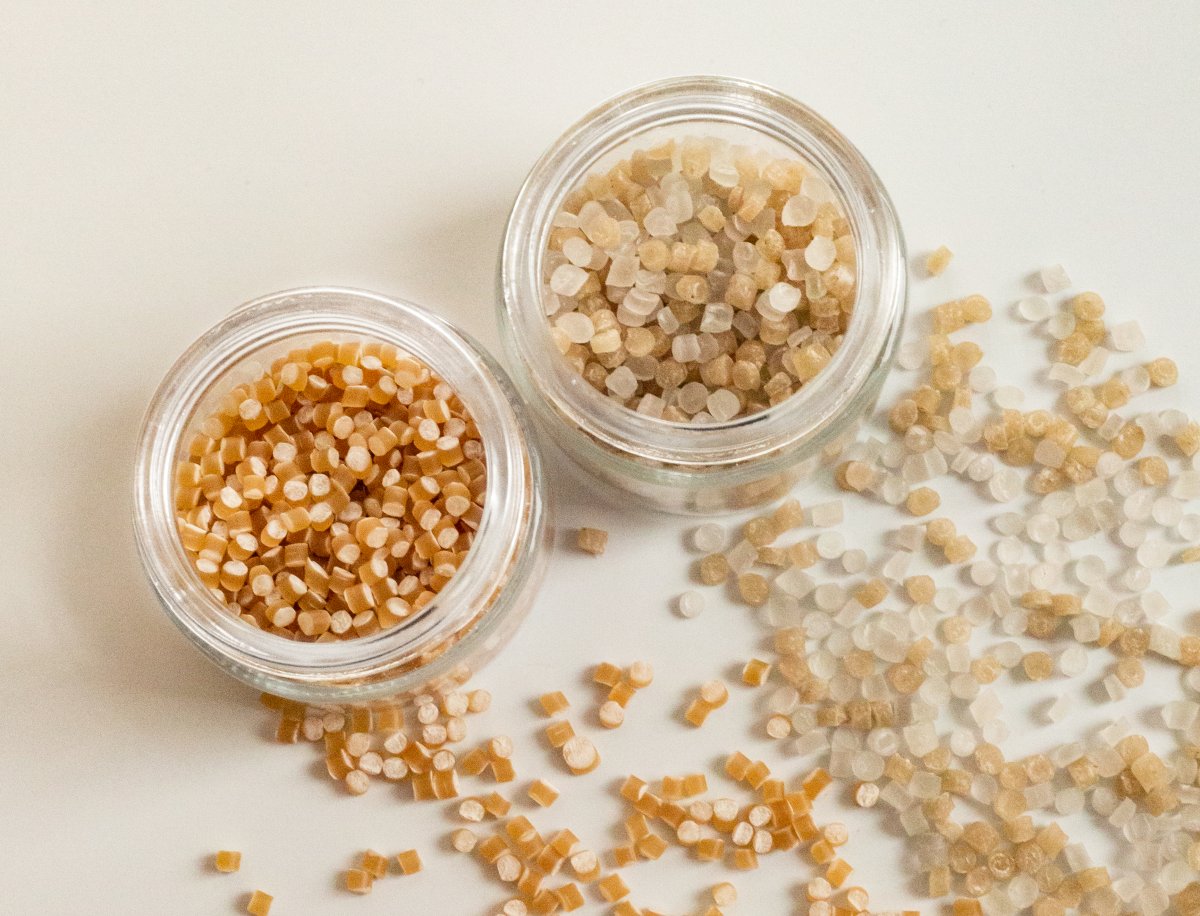

And after those last few years, why rebrand to erthos now?
When we initially started EcoPackers, it was a packaging company. It was what we thought would be the solution to plastics and how we could try to create an alternative. Along the way, we realized that although there was value in what we were building, we weren’t truly making it a scalable solution for the industry with the packaging approach and having just one solution and one product. So, we took a step back and we went to Asia to really understand what solution we needed to build for this industry. When we came back and started completely redesigning our business model, we realized that we had gone above and beyond that one solution and one product.
We were building a solution for multiple supply chain levels, and we were creating a solution for materials in general. So in the past year alone, our users and our solutions have expanded across multiple industries. We have finally been able to understand the full potential of our products and we realized that we completely redefined that scope and that purpose for our planet. We decided to rebrand to erthos, and it’s not just a rebrand of our name or our identity, it’s really our belief in materials that put our earth first.
If we can hold products that we consume as human beings to a higher standard then we believe that materials that surround our environment should also be put to that high standard. Any products that are made with our solutions will be erthos certified and recognized with our erthos icon. Partners and consumers, like you and me, will be able to feel like we’re part of that solution to help eliminate some of the plastic on our planet.
What is the scope of the products that can be used with erthos biodegradable plant-based plastic?
Our materials focus on solutions for single-use plastics or limited use plastics, given that they make about 50 percent of the current plastic production in the world today. Things like packaging, casing, cutlery, all of those are under our scope. We allow existing manufacturers to create those single-use plastics with our solutions. We also work with brands to make sure that they can accept and effectively integrate our solutions into their current supply chains.
What were the main challenges in bringing erthos plant-based plastics to life?
I think eco-friendly plastics have evolved over decades. For erthos, we’ve prioritized a few things for our materials and our planet. We think having a truly compostable product is one of the most important parts because there are limits to current infrastructure like recycling and industrial commercialized waste management. The second aspect of it is compatibility. We spent a lot of time the past two years making sure that our solutions were compatible with the existing infrastructure.
It’s funny because startups usually want to find a way to disrupt the industry, but we took a bit of a different approach. We tried to disrupt the industry as little as possible and make sure that it was compatible with the infrastructure that we’ve spent decades building. So, compatibility and compostability were our two main challenges and also key features that we needed to make sure we embedded in our material.
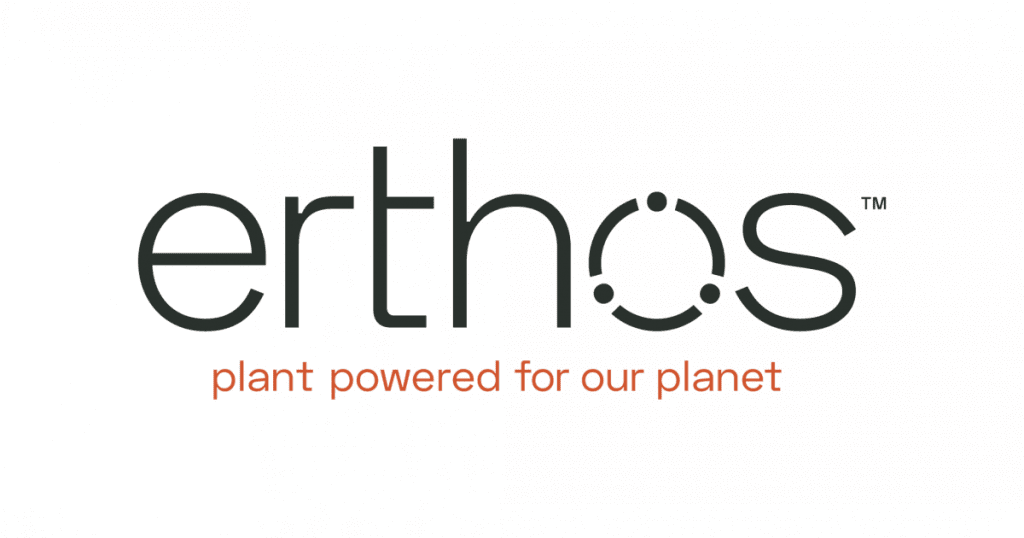

You, along with your co-founders, are three females who came together quite young—right out of school. What was it like as a female three-person team going up against a huge industry?
I think being young female founders in a male-dominated industry, like manufacturing and plastics, has definitely been a challenge for us, but I think we always knew it would be a challenge. We never thought it would be easy. So, we told ourselves very early on that we would keep our heads down and we would focus on just building a really great product. And that’s what we did.
We tried to just not get caught up in any noise or distraction, which is challenging at times, but it’s really important to just keep our heads down. We never let that [being young and female] define us. Even today with the way that we built our team, we recognize that diversity has truly brought forward the most unique solutions to what we’re building and that’s how we’ve aligned. It’s always been a part of our values. It’s a long way to go, and it’s been challenging, but also extremely rewarding to be in the industry as three females.
As your team has grown to 20 people now, what has erthos been working on as of late?
Along with the rebrand, we’re really, really excited for this year, as it’s the first year that we launch a product to market. We’re getting ready to launch one of our first single-use, 100 percent plant-based alternative plastics to the industry. We’re also working alongside a lot of really great partners and manufacturers to move that standard for materials forward and truly make plant-powered materials the new normal. That’s our focus for this year, along with growing our team—we’ve just launched our new headquarters here in Toronto!
You mentioned that even back in your university days, social enterprise was something that you found very important and fascinating. Why do you think founders and startups should consider their social responsibility when creating companies?
I think we had a little bit of a shift in that because when we first started EcoPackers, we titled it as a social enterprise. We thought calling it a social venture was going to help us differentiate from other ventures in the industry. However, we slowly realized that there was no need to actually differentiate as a social venture because every business should have that fundamental foundation for social business.
We are a clean-tech company, but we make sure that we’re also building a great product. To us, great products mean socially driven or have some kind of benefit on our planet. So I think it just has to start becoming a natural part of every business and it should no longer have to be differentiated or defined separately from every other venture.
You’ve grown from a passion project to a rebrand with tons of lessons in between. What advice would you tell yourself at the beginning of the journey that you’ve learned throughout the whole process?
When we first started as eager university students, we were very curious. I don’t necessarily think we realized how complex the problem was until we really put ourselves out there in the real world. So I’d say no matter how complicated it may get, no matter how big of the problem it may end up becoming, do not look back or doubt that the solution that we’re building is truly meaningful and impactful.
I would also say that collaboration has been the most important part of it and make sure that we’re collaborating and not working against industry, but working alongside it. Those are sort of the key lessons and things that I’ve learned over time in the past few years that have made a big difference in our trajectory.
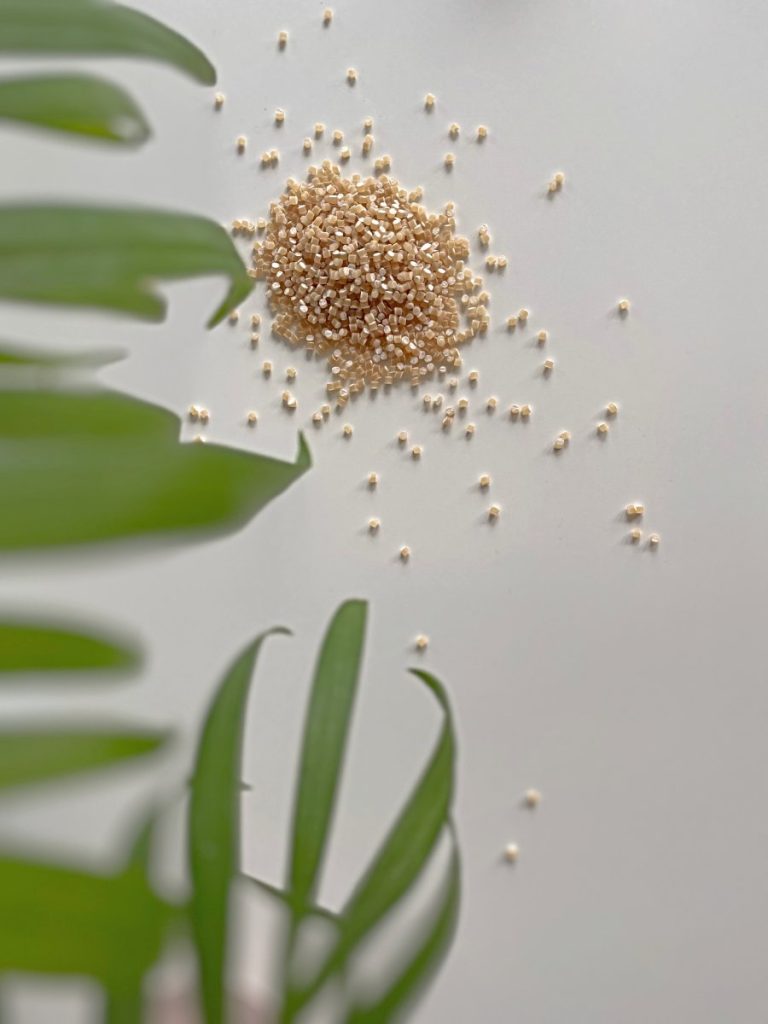

If I think back to that moment where I was deciding with my co-founders, whether we were moving forward after graduating, I think it always came down to our gut feeling. I remember actually being told this by one of my professors at Rotman, “No matter how calculated a decision can get, conditioning your gut to really know when something feels right is probably the most important.” I always say to go with your gut and if it is truly something that you can’t do again, or you won’t have that opportunity to build again, then there should be no question about it—take that leap.
What are your wildest dreams of how erthos can change the world?
Our long-term vision or goal is to make all single-use plastics, plant-powered. We want to be able to provide that solution and build a technology that isn’t just unique to one country or one geography. We want it to truly be a technology that can scale across all materials. And we want to be able to create a better standard and a better belief in earth-based materials.[/vc_column_text][vc_separator color=”custom” accent_color=”#6aa37f”][/vc_column][/vc_row]


